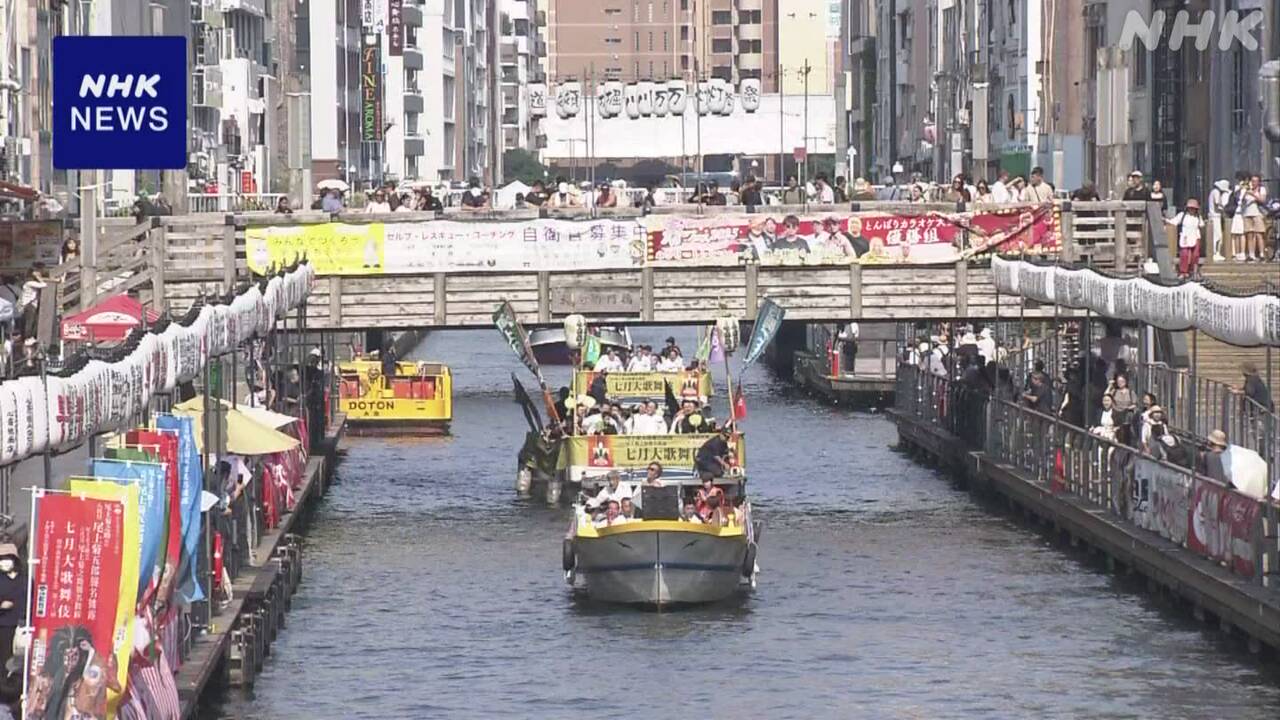Published: 2025-07-02 04:06
大阪 歌舞伎俳優が船に乗って顔見せをする「船乗り込み」

今月、大阪で始まる歌舞伎の夏の公演を前に、歌舞伎俳優たちがのぼりなどで飾られた船に乗って顔見せをする「船乗り込み」が行われました。
「船乗り込み」は歌舞伎俳優たちが江戸や京都から大阪に到着した際に行われていた儀式で、江戸時代の文献にも記録が残っています。
1日は、今月5日から大阪松竹座で始まる「七月大歌舞伎」に出演する尾上菊五郎さんや、長男の菊之助さん、人間国宝の片岡仁左衛門さんなど、19人の歌舞伎俳優が参加し、のぼりやちょうちんで飾られた船に乗り込みました。
一行は道頓堀川など2.5キロほどの川を船でめぐり、歌舞伎ファンの拍手や紙吹雪で出迎えられる中、戎橋のたもとに到着しました。
そして、歌舞伎俳優を紹介する「口上」が行われました。
このあと歌舞伎俳優たちは公演が行われる大阪松竹座に移って抱負を述べ、最後に片岡仁左衛門さんが「皆さんがご多幸で世界が平和でありますように」と述べ「大阪締め」をして公演の成功を祈りました。
「七月大歌舞伎」は今月5日から24日まで行われます。
| # | 言葉 | 意味 |
|---|---|---|
| 9 | 歌舞伎 | かぶき (歌舞伎) : kabuki; Japanese classical drama |
| 5 | 大阪 | おおさか (大阪) : 1. Osaka (city, prefecture) 2. large hill |
| 5 | 俳優 | はいゆう (俳優) : actor; actress; player; performer |
| 5 | 行う | おこなう (行う) : to perform; to do; to conduct oneself; to carry out |
| 3 | 公演 | こうえん (公演) : 1. public performance 2. exhibition in a foreign country |
| 3 | 船 | ふね (船) : 1. ship; boat; watercraft; vessel; seaplane 2. tank; tub; vat; trough |
| 2 | のぼり | のぼり (上り) : 1. ascent; climbing; ascending (path); climb 2. up-train; train heading toward the starting point of its route |
| 2 | 飾る | かざる (飾る) : 1. to decorate; to ornament; to adorn 2. to display; to exhibit; to put on show; to arrange |
| 2 | 船乗り | ふなのり (船乗り) : 1. getting on board 2. sailor; seaman |
| 2 | 込み | こみ (込み) : 1. including; inclusive of 2. komi; extra points given to the white player as compensation for playing second (in go) |
| 2 | 到着 | とうちゃく (到着) : arrival |
| 2 | 松竹 | しょうちく (松竹) : Shouchiku (place; surname) |
| 2 | 片岡仁左衛門 | かたおかにざえもん (片岡仁左衛門) : Kataoka Nizaemon (1944.3-) (person) |
| 2 | 述べる | のべる (述べる) : to state; to express; to mention |
| 1 | 乗る | のる (乗る) : 1. to get on (train, plane, bus, ship, etc.); to get in; to board; to take; to embark 2. to get on (e.g. a footstool); to step on; to jump on; to sit on; to mount |
| 1 | 顔見せ | かおみせ (顔見せ) : 1. making one's debut; making one's first appearance 2. (just) showing one's face; showing up |
| 1 | 江戸 | えど (江戸) : Edo (shogunate capital, now Tokyo); Yedo |
| 1 | 京都 | きょうと (京都) : Kyoto (city, prefecture) |
| 1 | 際 | きわ (際) : 1. edge; brink; verge; side 2. time; moment of |
| 1 | 儀式 | ぎしき (儀式) : ceremony; rite; ritual; service |
| 1 | 江戸時代 | えどじだい (江戸時代) : Edo period (1603-1868 CE) |
| 1 | 文献 | ぶんけん (文献) : literature; books (reference); document |
| 1 | 記録 | きろく (記録) : 1. record; minutes; document 2. record (e.g. in sports); results; score |
| 1 | 残る | のこる (残る) : to remain; to be left |
| 1 | 出演 | しゅつえん (出演) : performance; appearance (in a stage, film, TV show, etc.) |
| 1 | 尾上菊五郎 | おのえきくごろう (尾上菊五郎) : Onoe Kikugorou (1942.10-) (person) |
| 1 | 長男 | ちょうなん (長男) : eldest son (may be the only son); first-born son |
| 1 | 菊之助 | きくのすけ (菊之助) : Kikunosuke (masc) |
| 1 | 人間国宝 | にんげんこくほう (人間国宝) : living national treasure |
| 1 | 参加 | さんか (参加) : participation; joining; entry; adherence |
| 1 | ちょうちん | ちょうちん (提灯) : paper lantern; Chinese lantern; Japanese lantern |
| 1 | 乗り込む | のりこむ (乗り込む) : 1. to board; to embark on; to get into (a car); to man (a ship); to help (someone) into 2. to march into; to enter |
| 1 | 一行 | いちぎょう (一行) : (one) line; (one) row |
| 1 | 道頓堀 | どうとんぼり (道頓堀) : Doutonbori; Dotombori (place) |
| 1 | めぐる | めぐる (巡る) : 1. to go around 2. to return |
| 1 | 拍手 | はくしゅ (拍手) : clapping hands; applause |
| 1 | 紙吹雪 | かみふぶき (紙吹雪) : confetti; ticker tape |
| 1 | 出迎える | でむかえる (出迎える) : to meet; to greet |
| 1 | 戎橋 | えびすばし (戎橋) : Ebisubashi (unclass) |
| 1 | たもと | たもと (袂) : 1. sleeve (esp. of a kimono); pocket of sleeve 2. vicinity (esp. of a bridge) |
| 1 | 口上 | こうじょう (口上) : 1. vocal message; speech; statement 2. prologue at the start of a kabuki performance |
| 1 | 移る | うつる (移る) : 1. to move (house); to transfer (department) 2. to change the target of interest or concern |
| 1 | 抱負 | ほうふ (抱負) : aspiration; ambition; plan; hopes; wishes |
| 1 | 多幸 | たこう (多幸) : great happiness |
| 1 | 平和 | へいわ (平和) : peace; harmony |
| 1 | 締め | しめ (締め) : 1. tie up; bind; fastening; tightening 2. sum; total amount; total |
| 1 | 成功 | せいこう (成功) : success; hit |
| 1 | 祈る | いのる (祈る) : to pray; to wish |